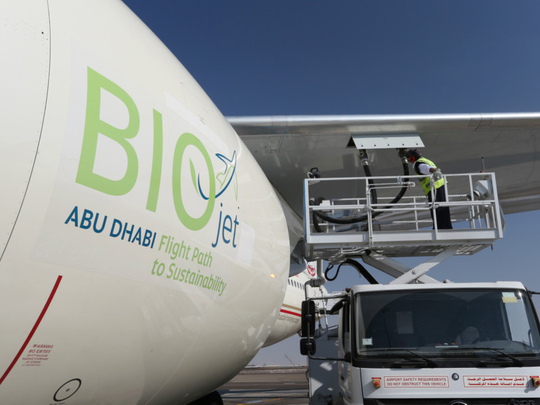
Abu Dhabi: Production of aviation biofuel is set to take off in Abu Dhabi in conjuction with a modern aquaculture project that is also aimed to meet growing food demand.
Under the Integrated Seawater Energy and Agriculture System (ISEAS), a two-hectare farm at Masdar City will experiment using seawater and organic waste to help grow native halophytes for generating biofuel, while producing fish and shrimps.
ISEAS is one of the major strategies outlined in the "BIOjet" Abu Dhabi roadmap to develop the sustainable production of biofuels in the UAE.
As Abu Dhabi aims to develop a major aquaculture industry, the project also promises to solve issues associated with aquaculture water discharge without treatment that could potential cause huge environmental damage.
Native halophytes
But the project offers a simple solution: by using the effluents to irrigate halophytes and mangroves, the plants can then be used as potential feed for generating biofuels.
Apart from biofuel, halophytes may potentially generate by-products such as highly valuable chemicals, pharmaceuticals and nutraceuticals. Proponents say this set-up makes the project commercially viable.
This feedstocks could offer a high potential for a 50 per cent or greater reduction of greenhouse gas emissions relative to the fossil fuel use.
Planted mangroves can also add significant carbon storage capability in vegetation and soils. Mangroves provide increased habitat for birds and other species, and ecotourism opportunities.
A hectare of mangrove provides ecosystem protection worth $13,353 per annum, including $8,966 for storm protection, $3,679 for erosion control and $708 for fisheries maintenance.
Scaling up
If this pilot project is successful, a 200,000-hectare commercial farm will take the project forward in future, Dr Alejandro Rios G, Director of Sustainable Bioenergy Research Consortium (SBRC) at Masdar Institute said.
A 200,000-hectare farm of halophytes, he reckons, can produce the biofuel to fly a plane from Abu Dhabi to London and back, he said.
“When we talk of biofuel, people ask whether we are crazy [because of lack of fresh water to grow plants in the UAE]. Yes we are crazy…but to utilise abundant seawater for biofuels,” Rios told Gulf News.
Of the identified 15 species of native halophytes, ‘salicornia bigelovii’ has been selected for biofuel production.
Generally commercial halophyte farms are around 20,000 hectares. “If you have such 10 to 20 farms, you can meet the 3 to 5 per cent global biofuel demand.”
Pioneers
The Sustainable Bioenergy Research Consortium (SBRC), led by the Masdar Institute with funding partners including Etihad Airways, The Boeing Company, UOP Honeywell, Safran and GE is pioneering the Integrated Seawater Energy and Agriculture System (ISEAS).
ISEAS is an effort to develop a novel form of agriculture, producing food and energy products on traditionally non-arable desert land irrigated with seawater.
The roadmap highlights the potential of organic waste in biofuel industry. As agriculture, municipal and sludge wastes are growing every year, they will be transformed into feedstock for biofuel.












